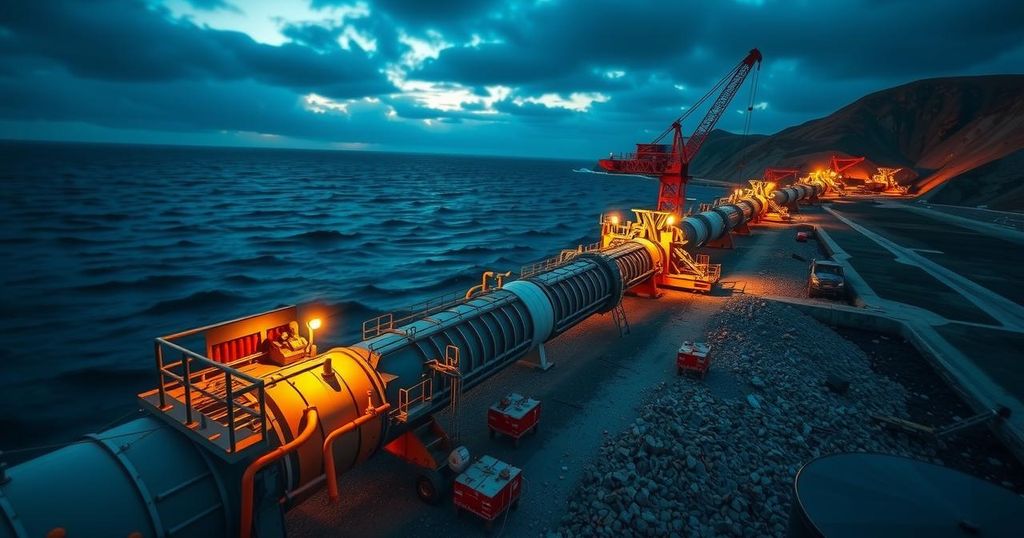Progress of East African Crude Oil Pipeline Reaches 47.1 Percent Completion
The East African Crude Oil Pipeline (Eacop) Project is 47.1 percent complete as of September 2024, with a total estimated cost of $3.5 billion. This joint venture involves the Tanzanian and Ugandan governments and international oil companies, with significant ongoing compensation for local residents and employment opportunities in the region. Project completion is anticipated by July 2026, with a strong emphasis on environmental and social considerations throughout the implementation process.
As of September 2024, the East African Crude Oil Pipeline (Eacop) Project, which stretches from Uganda to Tanzania, has achieved a completion rate of 47.1 percent. This significant milestone reflects extensive pipe-laying operations across eight regions since construction began in February 2022. The Eacop project is a collaborative effort between the governments of Tanzania and Uganda, each holding a 15 percent stake, with TotalEnergies owning 62 percent and CNOOC holding the remaining 8 percent. The estimated total cost of the project is approximately $3.5 billion, necessitating thorough logistical and environmental planning to mitigate any adverse effects on local ecosystems and communities. During a recent press briefing, Mr. Asiadi Mrutu, the project coordinator from the Tanzania Petroleum Development Corporation (TPDC), confirmed that construction is proceeding according to the established timetable, with an expected completion date set for July 2026. Mr. Mrutu stated, “We are on the right track, and construction will be completed on schedule, as per the contract.” Furthermore, as of September, compensation payments have been made to 9,858 residents, amounting to Sh35.1 billion, indicating a proactive approach to addressing the needs of affected communities. The Eacop project has also had a positive impact on local employment, with approximately 8,694 Tanzanians securing temporary jobs since the project’s inception. Mr. Mrutu highlighted the additional economic benefits, stating, “The project has brought numerous benefits to Tanzania, including government revenue from permits, fees, and land taxes. Additionally, local services, worth Sh821.1 billion, have been procured for the project.” He emphasized the importance of safeguarding the project’s infrastructure, noting that local communities are collaborating with regional governments to prevent sabotage. Once completed, 148 individuals, including 114 Tanzanians and 34 Ugandans, will be offered permanent employment, and training programs are currently in place for ongoing skill development. Mr. Mrutu further underscored the commitment to stakeholder engagement, affirming, “We have invited stakeholders to participate in meetings, seminars, and discussions on important project issues. This ensures that their opinions are considered in the project’s implementation.”
The East African Crude Oil Pipeline (Eacop) Project is a significant oil export pipeline that runs from landlocked Uganda to the Tanzanian port of Tanga. This venture represents a collaborative approach between the governments of Uganda and Tanzania and international oil companies, aiming to facilitate efficient oil transportation while boosting local economies. The project involves considerable investments and resource allocation to ensure compliance with environmental standards and the welfare of local communities. The designation of significant percentages of shares to both governments and multinational companies showcases the vested interests and stakes in the successful implementation of the project.
In conclusion, the East African Crude Oil Pipeline (Eacop) Project is progressing well, currently standing at 47.1 percent completion. With a robust financial backing and a commitment to addressing local community needs, the project signifies not just an infrastructural development but also a boost to regional economies. The establishment of stakeholder engagement processes further demonstrates an inclusive approach to project implementation, aiming for a balanced consideration of economic, environmental, and social impacts.
Original Source: www.thecitizen.co.tz




Post Comment